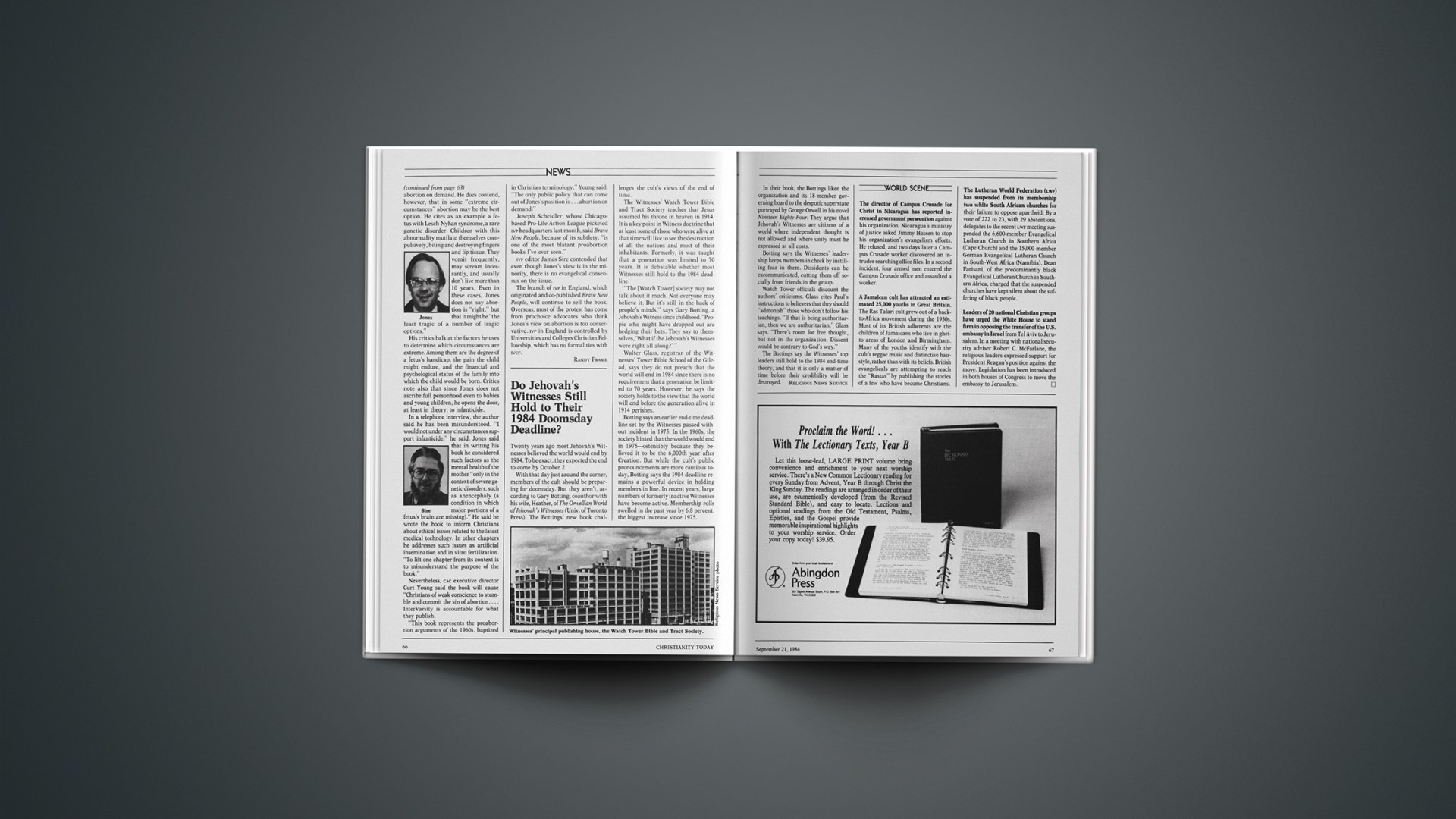Twenty years ago most Jehovah’s Witnesses believed the world would end by 1984. To be exact, they expected the end to come by October 2.
With that day just around the corner, members of the cult should be preparing for doomsday. But they aren’t, according to Gary Botting, coauthor with his wife, Heather, of The Orwellian World of Jehovah’s Witnesses (Univ. of Toronto Press). The Bottings’ new book challenges the cult’s views of the end of time.
The Witnesses’ Watch Tower Bible and Tract Society teaches that Jesus assumed his throne in heaven in 1914. It is a key point in Witness doctrine that at least some of those who were alive at that time will live to see the destruction of all the nations and most of their inhabitants. Formerly, it was taught that a generation was limited to 70 years. It is debatable whether most Witnesses still hold to the 1984 deadline.
“The [Watch Tower] society may not talk about it much. Not everyone may believe it. But it’s still in the back of people’s minds,” says Gary Botting, a Jehovah’s Witness since childhood. “People who might have dropped out are hedging their bets. They say to themselves, ‘What if the Jehovah’s Witnesses were right all along?’ ”
Walter Glass, registrar of the Witnesses’ Tower Bible School of the Gilead, says they do not preach that the world will end in 1984 since there is no requirement that a generation be limited to 70 years. However, he says the society holds to the view that the world will end before the generation alive in 1914 perishes.
Botting says an earlier end-time deadline set by the Witnesses passed without incident in 1975. In the 1960s, the society hinted that the world would end in 1975—ostensibly because they believed it to be the 6,000th year after Creation. But while the cult’s public pronouncements are more cautious today, Botting says the 1984 deadline remains a powerful device in holding members in line. In recent years, large numbers of formerly inactive Witnesses have become active. Membership rolls swelled in the past year by 6.8 percent, the biggest increase since 1975.
In their book, the Bottings liken the organization and its 18-member governing board to the despotic superstate portrayed by George Orwell in his novel Nineteen Eighty-Four. They argue that Jehovah’s Witnesses are citizens of a world where independent thought is not allowed and where unity must be expressed at all costs.
Botting says the Witnesses’ leadership keeps members in check by instilling fear in them. Dissidents can be excommunicated, cutting them off socially from friends in the group.
Watch Tower officials discount the authors’ criticisms. Glass cites Paul’s instructions to believers that they should “admonish” those who don’t follow his teachings. “If that is being authoritarian, then we are authoritarian,” Glass says. “There’s room for free thought, but not in the organization. Dissent would be contrary to God’s way.”
The Bottings say the Witnesses’ top leaders still hold to the 1984 end-time theory, and that it is only a matter of time before their credibility will be destroyed.
RELIGIOUS NEWS SERVICE
World Scene
The director of Campus Crusade for Christ in Nicaragua has reported increased government persecution against his organization. Nicaragua’s ministry of justice asked Jimmy Hassen to stop his organization’s evangelism efforts. He refused, and two days later a Campus Crusade worker discovered an intruder searching office files. In a second incident, four armed men entered the Campus Crusade office and assaulted a worker.
A Jamaican cult has attracted an estimated 25,000 youths in Great Britain. The Ras Tafari cult grew out of a back-to-Africa movement during the 1930s. Most of its British adherents are the children of Jamaicans who live in ghetto areas of London and Birmingham. Many of the youths identify with the cult’s reggae music and distinctive hairstyle, rather than with its beliefs. British evangelicals are attempting to reach the “Rastas” by publishing the stories of a few who have become Christians.
The Lutheran World Federations (LWF) has suspended from its membership two white South African churches for their failure to oppose apartheid. By a vote of 222 to 23, with 29 abstentions, delegates to the recent LWF meeting suspended the 6,600-member Evangelical Lutheran Church in Southern Africa (Cape Church) and the 15,000-member German Evangelical Lutheran Church in South-West Africa (Namibia). Dean Farisani, of the predominantly black Evangelical Lutheran Church in Southern Africa, charged that the suspended churches have kept silent about the suffering of black people.
Leaders of 20 national Christian groups have urged the White House to stand firm in opposing the transfer of the U.S. embassy in Israel from Tel Aviv to Jerusalem. In a meeting with national security adviser Robert C. McFarlane, the religious leaders expressed support for President Reagan’s position against the move. Legislation has been introduced in both houses of Congress to move the embassy to Jerusalem.










